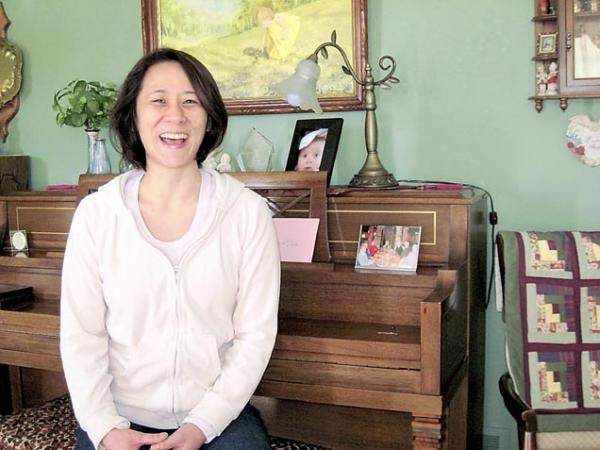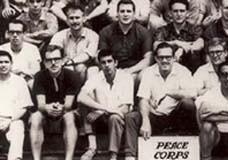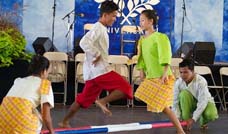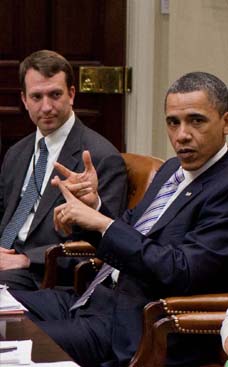
For the Peace Corps in Africa, Endres organized training for traditional midwives and negotiated the politics with the local ministry of health offices so the training could occur. She covered a region about half the size of Minnesota, training about 35 women in a two-year span. Following her experience in Africa, Endres moved to Washington, D.C., the hub for international development in the United States. To get her feet wet, Endres did a series of informational interviews to learn more about the industry. "I did what felt like 1,000 informational interviews," she said and laughed. "I'd get in by talking to every single person I knew who had any relationship to international development and seeing if they knew someone whose knowledge I could benefit from." She scheduled an hour to talk to the individuals. She arrived with a series of questions and asked people for their advice. What do you like about what you do? How did you get to your position? How do I get there? One of the people she interviewed, a contractor with the U.S. government, called her at her parent's home in Brainerd and offered her a job at Mendez England & Associates in the nation's capital. "I think that's how most of my jobs have gone is because they met me face to face," Endres said. "I think that might be the way of the world.
Mauritania RPCV Kyung Endres oversees projects spanning several countries from evaluating the effectiveness of health programs to projects on food security and nutrition
Brainerd grad creates global career
Posted: August 30, 2011 - 7:56pm
By Renee Richardson
Senior Reporter
Caption: Kyung Endres, Brainerd High School graduate, traveled the globe since growing up in the lakes area. She created her own international consulting firm based in Washington, D.C., but makes it home to visit family several times a year. Brainerd Dispatch/Renee Richardson
Brainerd Dispatch/Renee Richardson
As a child in Brainerd, Kyung Endres was blessed with a curious nature and a drive for discovery.
That drive has taken her across the globe as CEO of her own firm. This year, she's been a consultant or technical adviser on programs in Haiti, Malawi and Tanzania. How she got there may be a road map for others who have a passion, but aren't sure how to go from central Minnesota to work on several continents.
The 1988 Brainerd High School graduate went on to Hamline University in St. Paul to major in biology.
"I felt like biology would be a place to discover new things," she said during a visit to the home of her parents, Dick and Jeanne Endres.
As CEO of her own international firm True Panacea based in Washington D.C., Endres oversees projects spanning several countries from evaluating the effectiveness of health programs to projects on food security and nutrition. She's lived and worked in more than 20 countries, doing everything from helping farmers increase productivity to improving management of health care service delivery.
Her clients include Care International, Save the Children Federation, American Red Cross, American Refugee Committee, The Centers for Disease Control and Prevention, USAID, The Mitchell Group, Catholic Relief Services, United Nations Children's Fund, the Peace Corps and The Johns Hopkins University Bloomberg School of Public Health, to name a few.
"Mainly what I focus on is to try to help improve projects and programs by using data, by using information," Endres said.
For example, for the American Red Cross, Endres evaluated an HIV/AIDS prevention program with youths using education campaigns in Ghana, Haiti and Tanzania. Endres was scheduled to arrive in Haiti just a few days after the devastating earthquake in 2010.
In countries without mass media to reach the population, Endres evaluated if what Red Cross was doing was effective, to what degree and how it could be improved. Getting that data meant talking to a lot of people and training a team of seven local research assistants. Using statistical programs to evaluate the data, Endres came up with recommendations. In the end, the interpersonal communication was important, no matter how it was delivered. One of the recommendations implemented was to provide volunteers with skills and support they needed, whether it was providing a bicycle to hosting monthly meetings so volunteers felt their input was heard.
In her work, the project evaluations may cover parts of a county to full countries utilizing a handful of research assistants or hiring 45 people, as was the case in Rwanda.
So how does a girl raised in central Minnesota jump into an ability to travel the world on her own?
"In a lot of ways these capital cities in other countries are small towns," Endres said. "They are like Brainerd in a lot of ways, with a lot fewer stores. You know people are the same everywhere. You have a whole range of skills and personalities and how people live. And you just learn how to adapt to different ways of thinking.
"Every time I go into a new place, the first thing I learn is how to solve a problem. Because every one has different ways of solving problems in any given culture."
Endres said her family's involvement in the community and focus on helping other people gave her a good foundation, which was influential in how she lives her life and runs her business.
Through her parent's example and family, Endres said she learned how community members can take responsibility for their own well-being and a sense of personal responsibility for one's fellow man. Endres' father started Camp Confidence and her mother started Natural Family Planning in Brainerd.
"They just weren't afraid to start things where they saw a need," Endres said. "I really appreciated that a lot and still do."
When she was a child, Endres said her parents put her in Kamp Kimchee, a Korean culture camp for adopted Korean children, which she didn't appreciate as much at the time as she does now. Through her school years, the ability to try many activities from piano lessons to dance, to sports and having role models at home, Endres said, all went into creating a confident person who was willing to take responsibility for injustices and lead people through chaos to order. Endres credits her mother's perseverance in helping to show her the way to succeed.
"She wasn't afraid to step out on her own," Jeanne Endres said of her daughter.
In her global work, Endres specializes in food security, community livelihoods development and public health. Her company, which utilizes trained staff in host countries, provides monitoring and evaluation of programs, designs programs and trains staff and works with organizations for strategic planning. This spring, True Panacea was nominated by The Red Cross as one of its top five Asian American suppliers and was recognized at a ceremony in Los Angeles.
Her international exposure first came after college when she taught English in South Korea for two years. Then she joined the Peace Corps and went to Africa.
"That's where I got my entree into the whole industry of international development," Endres said. "International development is what we insiders call our trade and what everyone else might call international aid or development assistance.
"It piqued my interest in international issues, particularly in health."
For the Peace Corps in Africa, Endres organized training for traditional midwives and negotiated the politics with the local ministry of health offices so the training could occur. She covered a region about half the size of Minnesota, training about 35 women in a two-year span.
Following her experience in Africa, Endres moved to Washington, D.C., the hub for international development in the United States. To get her feet wet, Endres did a series of informational interviews to learn more about the industry.
"I did what felt like 1,000 informational interviews," she said and laughed. "I'd get in by talking to every single person I knew who had any relationship to international development and seeing if they knew someone whose knowledge I could benefit from."
She scheduled an hour to talk to the individuals. She arrived with a series of questions and asked people for their advice. What do you like about what you do? How did you get to your position? How do I get there?
One of the people she interviewed, a contractor with the U.S. government, called her at her parent's home in Brainerd and offered her a job at Mendez England & Associates in the nation's capital.
"I think that's how most of my jobs have gone is because they met me face to face," Endres said. "I think that might be the way of the world.
"A lot of people ask me for advice because they want to be doing what I am doing. They think it sounds very appealing and that is the one thing I always recommend. Get informational interviews. Don't be shy and don't waste that person's time. Go in there knowing what you want. Because people want to help you."
Feeling she needed more training for her career path, Endres pursued a graduate degree in public health from The Johns Hopkins University Bloomberg School of Public Health. Then she started as a consultant.
She's designed tracking systems so clients could get data from partners and analyze the data for informed decisions. In Malawi, she was hired by Save the Children to design an information system for the Ministry of Health to collect community health data. In her approach, Endres said she goes in to learn from people in the countries where she's working for a collaborative effort.
She's had first-hand views of how donations to international relief help.
"At the individual level it is making a huge difference," Endres said, noting as an example sponsorships of children. "On a global level, though, it is hard to see the impact. But in those children's lives, it's life changing."
As an example, Endres said a dollar here can maybe buy a small bag of chips. Internationally, it may buy a child's school books for a year or feed a family for a week. From a governmental policy perspective, Endres said the aid is viewed as a way to maintain stability in the world.
Once people find out she's an American, people love to critique former presidents. Bill Clinton is most popular as a strong proponent of international aid. Jimmy Carter is another for promoting much-appreciated food aid. George W. Bush started an appreciated HIV initiative.
Endres often works in Africa and said people expected more accolades for their efforts in democracy after President Obama was elected. She said they expressed surprise when he said in a visit democracy was more of an effort than an election and described it as a responsibility by the government and the people. They liked Obama's foreign policy of bringing countries together more than any specific aid program.
People looking for international experience have many opportunities as volunteers in short and longer term assignments from medical professionals to beekeepers.
"Don't assume anything and be flexible," Endres said of her advice to Americans. "You need to be cognizant of security. You never drink the water. You don't eat any raw vegetables or fruits. You clean them all in regular bleach."
Endres soaks food, apples or oranges, for instance, in water with a capful of bleach for 30 minutes. Travelers should check the State Department and CDC websites for safety and health concerns before traveling. Endres speaks French, as well, but said most of the people she works with do speak English.
When she was with the Peace Corps, Endres said it wasn't hard to live without running water or electricity or take four days to travel what would take a a little more than two hours here. But it was an adjustment to be a stranger in a strange land without a shared background or sense of having something in common.
Traveling from the village where she lived to the country's capital, about 310 miles, took four days. For the trip, public transportation meant a shared pickup truck bed and stopping to sleep at night on the side of the road. Since there are no street lights, the truck didn't drive at night. She described the road as more of a series of potholes than transportation route. Food came from bread and biscuits picked up along the way. Endres brought a five-gallon jug of water she'd end up sharing as other travelers across the desert terrain came with none, which always shocked her.
In that setting, Endres said a wash cloth/towel, sheets, a Swiss Army knife, duct tape, good walking shoes, a backpack, an umbrella, a water jug and a cup are good to bring.
"It's really an adventure," Endres said.
Now in her own company, Endres' business continues to experience growth as organizations look at the gap between what they are doing and how much more they could accomplish in a world where basic needs continue to be a struggle for so many.
"I think I was just lucky, quite frankly, in my career," Endres said. "People were willing to give me a chance to try things and to learn on the job."
















